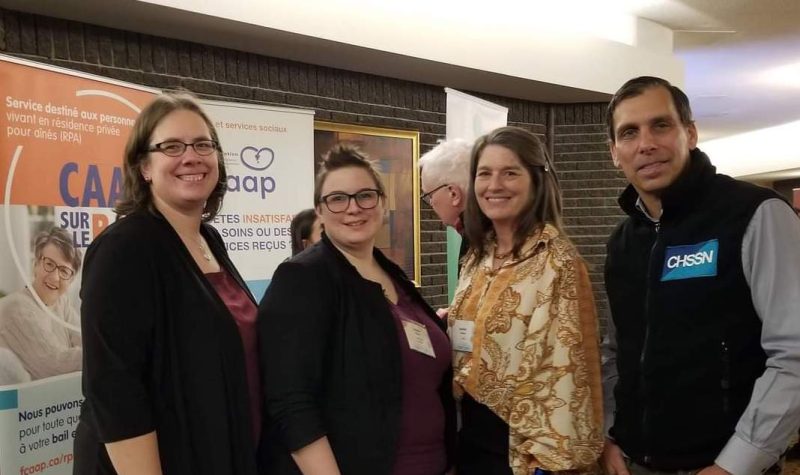The Fédération des Centres d’assistance et d’accompagnement aux plaintes (FCAAP) is a federation that represents the interests of complaint and support centres for health and social services and private senior’s residences in Quebec.
Wanting to spread the word about the type of support that CAAPs can offer to English speakers in the province, the FCAAP launched an English version of its video “What the CAAP can do for you?” in January. The video was created in collaboration with the Community Health and Social Services Network (CHSSN).
According to the FCAAP’s website, there are 16 regional CAAPs in the province, including one based in Sherbrooke for the administrative region of Estrie.
CAAP-Estrie provides bilingual services to citizens across the Eastern Townships. Angela Moore, complaints advisor and promotional agent for the English-speaking community for CAAP-Estrie, provides more details on how the non-profit organizations helps individuals with the complain process and the important role it plays in trying to improve certain services.
“We have two mandates. One is by the Minister of Health and Social Services to assist users and accompany them if they wish to complain about said services. (…) Our second mandate is by the Minister of Municipal Affairs and Housing and it’s to assist seniors in certified senior’s residences with their lease issues,” said Moore.
Moore explained that the CAAPs have confidentiality rules that limit her from providing details about the cases she has personally dealt with, but she provides some examples of the type complaints that people often make with the help of CAAP-Estrie.
“Some examples would be mental health services. If someone was supposed to receive a mental health service and they did not and they wanted a follow-up but never got it. They want to make a complaint to say that their mental health has deteriorated,” she highlighted. “We commonly see doctor errors. If a doctor made a mistake, gave someone the wrong medication, has injured a person, they can make a complaint.”
As an English-speaking advisor, Moore added that she often deals with complaints about accessing documents in English.
“If you have, in your file, certain documents, intervention plans, things like that that are only in French, we’ve had complaints where people have requested to have those documents in English,” she said.
Moore emphasized that CAAP-Estrie is not there to sue the health and social service institutions in the region or personnel.
“We can’t promise that they would get the service, but if it’s not for them then it’s for other people who might be going through the same thing. Our goal, with the collaboration of the Complaints and Service Quality Commissioner, is to make services better,” she noted.
The Complaints and Service Quality Commissioner is mandated by law to investigate a complaint while CAAP-Estrie is there to specifically help users with the complaint process.
“From what I’ve seen from multiple cases, usually when people are calling us they’ve gone through something really emotional and it’s not easy for them to navigate the healthcare system,” Moore explained. “(…) And then they have figure out how to complain and then some are wondering if they have to do it in French. (...) It’s a difficult process for some people and they just like to have that support. Like did I do this right? Did I include all of the correct documents?”
CAAP-Estrie can actually accompany people if they have a meeting arranged with the commissioner, Moore added.
“If there’s phone conversations that they aren’t sure about, we can accompany them through those phone calls as well. (…) We’re there to be like okay, so the commissioner has accepted your complaint, now they have 45 days,” she said. “If something happens within 45 days, here is how we can help you, and here is how we can help you after the conclusion as well because we can help people go to the Quebec Ombudsman.”
With this time of the year marking lease renewals in Quebec, Moore said it’s important to remind seniors living in private senior’s residences certified by the CIUSSS de l'Estrie - CHUS that CAAP-Estrie is there to help with any issues regarding their lease.
“If anyone has questions about the papers they are receiving from the owner or the manager of where they live, if they have has questions about what to do if it’s a reasonable increase, are they allowed to do this?, what are my options? They can reach out to us and we can help go over them,” she noted.
After the launch of the “What the CAAP can do for you?” video and spreading the word, Moore hopes to see more people take advantage of CAAP-Estrie’s services.
“It’s not just the English-speaking community, we have the same issue with the French-speaking communities; they don’t even know we exist. (…) We like to use the analogy of if someone’s water heater breaks, do they already have a list of repair people or are they only, quickly, once the water is all over the basement floor, trying to look through the phone book or on the internet to try and find someone to fix it when it’s too late? We’re trying to get the information out beforehand that way if something happens they don’t have to be stressed to find our information,” she said.
CAAP-Estrie’s regional number is 819-823-2047. The toll free number is 1-877-767-2227.
More information on the CAAPs can be found at this website.
CIDI reached out to the CHSSN, but did not hear back before press time.
Listen to the full interview below:


